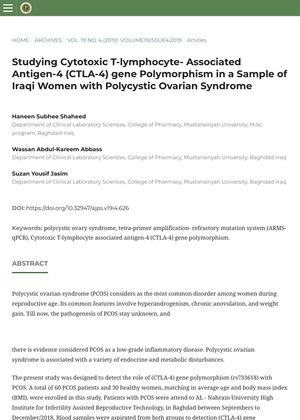Studying Cytotoxic T-lymphocyte- Associated Antigen-4 (CTLA-4) gene Polymorphism in a Sample of Iraqi Women with Polycystic Ovarian Syndrome
December 2019
in “Al-ʻulūm al-ṣaydalāniyyaẗ”

TLDR The CTLA-4 gene change studied does not affect Polycystic Ovarian Syndrome in the women tested.
The study, conducted in 2018, investigated the role of Cytotoxic T-lymphocyte- Associated Antigen-4 (CTLA-4) gene polymorphism (rs733618) in Polycystic Ovarian Syndrome (PCOS) among a sample of 60 Iraqi women with PCOS and 30 healthy women. The participants were matched in average age and body mass index (BMI). The researchers used the tetra-primer amplification-refractory mutation system based on real time polymerase chain reaction (ARMS-qPCR) to detect the CTLA-4 gene polymorphism. The results showed normal genotyping for both groups, leading to the conclusion that the CTLA-4 gene polymorphism (rs 733618) does not play a role in PCOS.
View this study on ajps.uomustansiriyah.edu.iq →
Related

research Caring for women with polycystic ovary syndrome
Treating PCOS is complex, involving medication like metformin and lifestyle changes, and requires attention to mental health due to high depression and anxiety rates.

research Current aspects of polycystic ovary syndrome: A literature review
Polycystic ovary syndrome is a common hormonal disorder in women, linked to increased risk of metabolic and heart diseases, and needs more research for better understanding and treatment.

research Screening for diabetes in women with polycystic ovary syndrome
Women with PCOS should have an oral glucose tolerance test for effective diabetes screening.